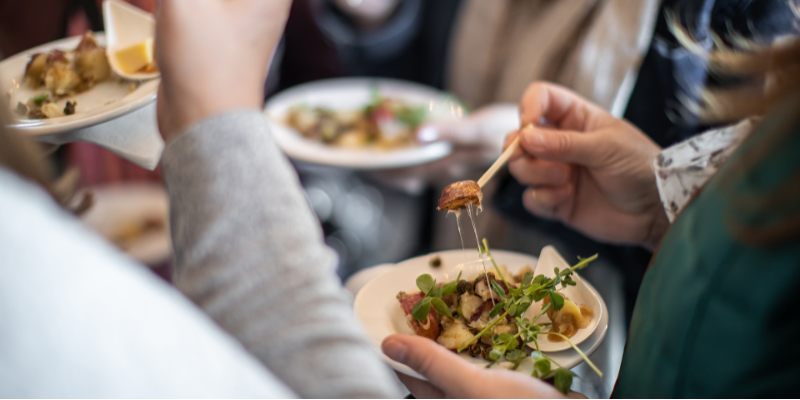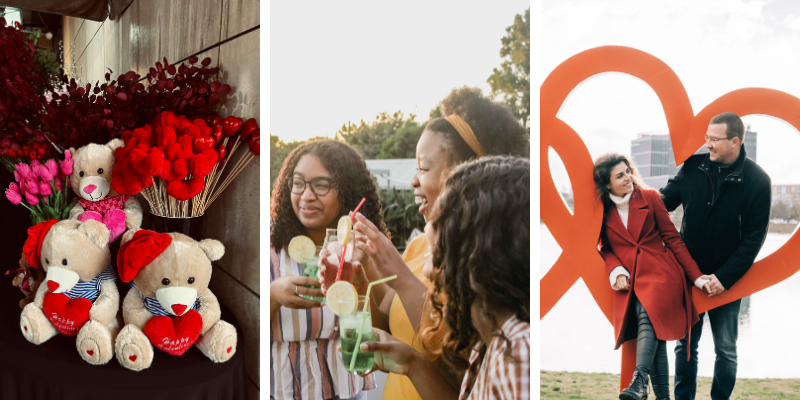“Do you have any gluten free options?”
Questions like this are becoming more and more common at events of all shapes and sizes. The CDC estimates more than 16 million adults and 4 million children in the U.S. have a food allergy. And the number of children with food allergies is growing. So the odds that you’ll have at least one guest at your event with a food allergy are pretty high.
More than 160 different foods can cause an allergic reaction in some people. But the top 9 foods account for more than 90% of allergic reactions, so we’ll focus on those for this story. The most common food allergies are:
- Milk
- Eggs
- Fish (such as bass, flounder, cod)
- Crustacean shellfish (such as crab, lobster, shrimp)
- Tree nuts (such as almonds, walnuts, pecans)
- Peanuts
- Wheat
- Soybeans
- Sesame
With so many different allergies, it’s tough to meet the needs of every guest. But there are some simple strategies you can follow to make sure as many guests as possible are able to enjoy the food and beverage offerings as your next event.
By taking these 7 steps, you can create a safe and enjoyable environment for all your guests, including those with food allergies.
1. Gather Information in Advance
Ask During Ticket Purchase: Include a question about food allergies and dietary restrictions when guests are purchasing tickets. This way, you can anticipate and plan for specific needs.
With Passage, you can add a custom field built right into the checkout process. Guests can answer the question, "Do you have any food allergies or dietary restrictions? Please specify” right before they enter their credit card details, so you’ll have the information right in your ticket report.
Educate Yourself: You’ve taken an important first step by reading this blog. Before your event, spend a little time researching the most common food allergies and how other events accommodate them.
2. Vendor Communication
Work with Vendors: Communicate with food and beverage vendors about the importance of allergen awareness and safe food handling practices. Ensure they can provide detailed ingredient lists. Consider having a separate preparation area to avoid cross-contamination.
Training: Ensure all food service staff are trained to handle food allergies, recognize symptoms of allergic reactions, and know how to respond in case of an emergency.

3. Menu Transparency
Label Ingredients: Ensure all food items are clearly labeled on menus with ingredients and potential allergens. This can include common allergens like nuts, dairy, gluten, soy, shellfish, eggs, and more.
Provide Allergen-Free Options: Offer a variety of allergen-free food and beverage options. Work with your vendors to determine how you can adapt dishes without overburdening the chefs. Simply swapping flour tortillas for corn at the taco truck might be an easy choice.
Get creative with how you approach allergy-friendly dishes, too. For example, offering a vegan, gluten free pizza option not only covers wheat allergies, but dairy too. You don’t need to have one dish for each allergy. If you have a few dishes that are free from the Top 9 allergens, everyone can find something they are able to enjoy.
4. Emergency Preparedness
Emergency Plans: Have a clear emergency response plan in place. Ensure that event staff are aware of the plan and know how to use an epinephrine auto-injector (EpiPen) if necessary.
First Aid Stations: Set up well-marked first aid stations with staff trained to handle allergic reactions.
5. Clear Communication
Pre-Event Communications: Include allergy information on your website so guests can prepare in advance. Consider making periodic announcements on social media about allergen information and where guests can find allergen-free options.
Signage: Use clear and prominent signage around food areas to inform guests about potential allergens. Your signs might say something like, "Allergen Information: Please inform our staff of any food allergies. Detailed ingredient lists are available upon request."
Include allergy information on any printed maps, digital menus, or other materials that guests might use to navigate your event, too.

6. Special Arrangements
Dedicated Allergen-Free Zones: Set up a dedicated area with food and beverages that are free from common allergens. This offers guests peace of mind: they’ll feel comfortable knowing anything they order in this specific area will be safe for them to eat.
Custom Orders: If possible, allow guests to pre-order special meals that cater to their specific dietary needs. You don’t need to ask vendors to completely change a dish to make it allergy friendly, but sometimes a simple request like leaving the sesame seed garnish off a dish means more people can enjoy it.
7. Feedback and Follow-Up
Post-Event Feedback: Solicit feedback from attendees regarding the food options and allergen accommodations to improve future events. Send a survey asking guests what they thought of the allergy-friendly dishes and whether the allergy information was properly communicated.
Final Thoughts
How much work you put into these steps really depends on the type of event you’re hosting. Guests attending a concert will have very different expectations for concessions than those attending a food festival. But regardless of your event’s format and theme, you can use these steps to make sure as many guests as possible are able to enjoy your event while fueling their bodies.











